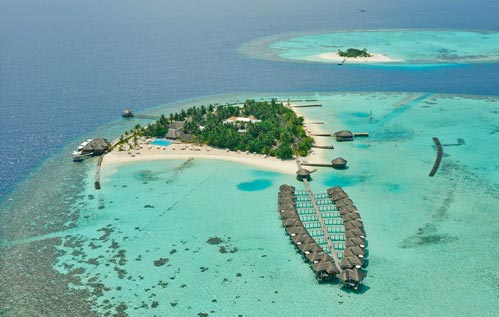

Maafushi is one of the inhabited islands of Kaafu Atoll and the proposed capital for the Medhu Uthuru Province of the Maldives. It is noted for the Maafushi Prison.

It was heavily damaged in the 2004 tsunami which impacted on over 100,000 of the Maldives 300,000 population. The International Federation of Red Cross and Red Crescent Societies, supported by the Irish and American Red Cross Societies, began work on a mains sewage system on August 10, 2006. The International Federation has also funded the building of homes for those who lost theirs during the tsunami. Both schemes are carried out in partnership with commercial contractors and with the support and involvement of the local community.
Maafushi is one of the islands in Maldives with a thriving local economy. While more than sixty families benefit directly from fishing, tourism industry has taken a new turn since 2010. With the government regulation allowing opening of Guest Houses in local islands, Maafushi was the first to secure an investment in tourism accommodation. The first guest house was opened in January 2010, and since then, many more have opened and they have provided the local community with foreign currency inflows. Tourists from neighboring resort islands also visit Maafushi for island hopping and Maafushi provides them with shopping opportunity with souvenir shops at assigned areas of the island.
According to the latest Census conducted in 2014, the total population of Maafushi is at 2,692 out of which 2,340 are Maldivians, and 352 foreigners. There has been a 17% increase in the residing population of the Island since the previous Census which was done in 2006. The population of Maafushi represents 13.84% of the total locality (Kaafu Atoll). This boom in population is mainly due to the guest house / hotel industry growth witnessed during the last 5 years.
In accordance with the recently passed Decentralization Act of Maldives, Maafushi is governed by an elected Island Council composed of five Councillors. The Council is headed by the President of the Council. The Island Council reports to the Local Government Authority (LGA). As democracy and decentralization is at the infant stage in Maldives, the councilors, and the government find it difficult to deal with important issues like land, and resource utilization. There are still many legal issues that need to be settled, before the island council can confidently perform its duties independently. There is also the issue of lack of know-how among the councilors. Most councilors are without basic education, and find it difficult to manage the day-to-day affairs of the island.